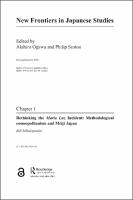Chapter 1 Rethinking the Maria Luz Incident
Proposal review
methodological cosmopolitanism and Meiji Japan
Abstract
This chapter adopts methodological cosmopolitanism to revisit the Maria Luz Incident (1872), a colourful diplomatic episode that involved two civil suits brought before a court created for the specific purpose of adjudicating whether the ship’s captain ill-treated and abused his Chinese ‘passengers’ while the ship was anchored for repairs in Yokohama Port. The chapter argues that the Maria Luz Incident was not a seminal moment when rights talk was introduced to Japan. Rather, the incident was due to a lack of consensus in international law regarding whether the ‘coolie trade’ was free labour or slavery. The research traces how international law and narrow ideas of freedom (the freedom to enter contracts) became aligned with the workings of Japanese licensed prostitution.
Keywords
Japanese studies; Japanese culture and society; Japanese politicsDOI
10.4324/9780367821494ISBN
9780367406806Publisher
Taylor & FrancisPublisher website
https://taylorandfrancis.com/Publication date and place
2020Imprint
RoutledgeClassification
Politics and government
Anthropology
Regional / International studies
Sociology


 Download
Download